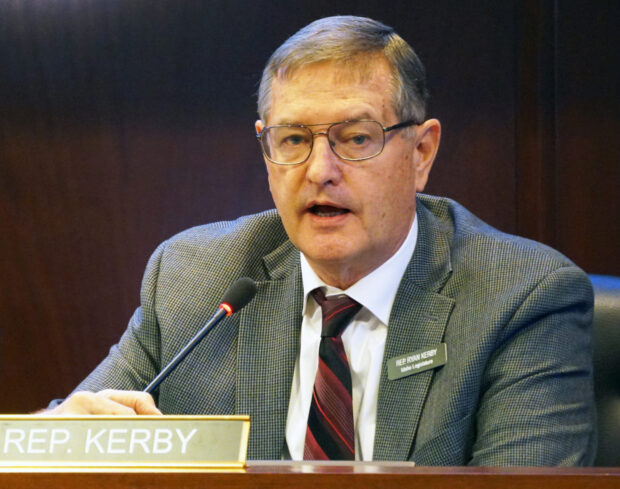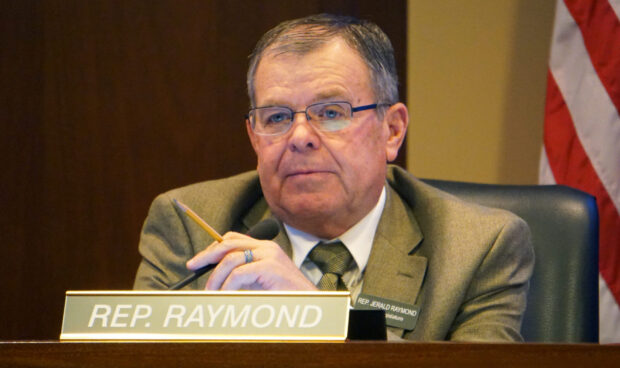After a long debate Thursday, the House Education Committee gave its blessing to a draft letter urging state officials to replace Idaho content standards.
The move follows a similar course of action from the Senate Education Committee Wednesday and represents the latest development in the years-long debate over academic standards.
Throughout the first two months of the 2020 legislative session, a divisive debate over rules and academic standards dominated education discussions. The House Education Committee voted last month to repeal all academic standards in math, English and science, but it was overruled by the Senate Education Committee, which approved all the standards.
The three-page letter, still in draft form, is addressed to Gov. Brad Little, the State Board of Education and Superintendent of Public Instruction Sherri Ybarra. The letter urges state officials to replace Idaho content standards, and specifically outlines recommendations for addressing math, English and science standards.
“Our concern is that any new standards developed by the State Board of Education and the State Department of Education may not be accepted by parents, educators, administrators, the public and therefore the Legislature,” the letter states.
The letter goes on to urge state officials to reduce the number of standards and use less complex verbiage. It urges officials to provide a better balance between fiction and nonfiction texts and emphasize “value-rich, historically important, and uplifting literature (particularly American and English literature).” It goes on to encourage officials to “provide balance” in the science standards, remove supporting content and “include both positive and negative aspects of energy sources.”

House Education Committee Vice Chairman Ryan Kerby, R-New Plymouth, said the purpose of the letter is to develop a solid understanding between all parties before the state goes about reviewing or writing new standards.
“We don’t want to waste time rejecting things that can be taken care of up front,” Kerby said.
Although the Republicans on the committee supported the letter, there was some disagreement over how to proceed. While the Senate Education Committee had its chairman and vice chairman sign the letter on the committee’s behalf, several of the House Education Committee’s rank-and-file members wanted to sign the letter themselves, instead of just having the chairmen sign it.
That irked House Education Democrats, who said they didn’t agree with everything in the letter and felt more comfortable having the committee’s leaders sign it on everyone’s behalf.
“Mr. Chairman, my name won’t be on this letter,” Rep. John McCrostie, D-Garden City, said.
McCrostie and Rep. Steve Berch, D-Boise, said the letter did not reflect the positions of the majority of professional educators who testified in support of retaining the standards earlier this year.
After some back and forth, the committee agreed to, essentially, approve the letter and let whoever wanted to sign it sign it, while the three Democrats voted against signing the letter.
House passes teacher certification bill
Voting along party lines, the House approved a last-minute bill designed to relax teacher certification requirements for non-public teacher education programs.
House Bill 599 would require the State Board to grant certificates to graduates from non-public programs, as long as the applicant holds a bachelor’s degree, passes a criminal background check, and passes content and pedagogical training.
Rep. Gary Marshall, R-Idaho Falls, described the bill as a “beginning,” a first step toward scaling back certification requirements that are cumbersome and have no effect on student outcomes.
Only one other lawmaker debated the bill. McCrostie, a music teacher, said the bill would create a stark contrast between traditional and nontraditional teacher certification programs.
While House Education has spent considerable time this session discussing certification issues, HB 599 has been on a legislative fast track. The committee introduced the bill Tuesday and sent it straight to the House floor for a vote, bypassing the standard public hearing. On Wednesday, McCrostie tried to convince the House to send the bill back to committee for a hearing, but the motion failed on virtually a party-line vote.
HB 599 now goes to the Senate.
Senate approves education-related budgets
The Senate quickly approved three education-related spending bills Thursday morning:
- Senate Bill 1381, the budget for the STEM Action Center. The center stands to receive slightly more than $3 million in general fund money, including $500,000 in ongoing state funding for its computer science initiative. The computer science line item accounts for a 17.7 percent funding increase. This budget passed on a 28-3 vote.
- Senate Bill 1382, a State Board of Education budget. The budget funds one of Gov. Brad Little’s top education priorities: $7 million in permanent money for the Idaho Opportunity Scholarship. The scholarship line item accounts for a 35.5 percent increase in this State Board budget, bringing the bottom line to $26.4 million in general fund money. This budget passed, 26-5.
- Senate Bill 1383, the community college budget. The four community colleges would receive $48.2 million from the state general fund, a 0.9 percent increase.
Discussion was limited. Sen. Lori Den Hartog, R-Meridian, said she voted against the State Board budget because she opposed the Opportunity Scholarship. Sen. Grant Burgoyne, D-Boise, voted for the community college budget, but said the funding increase was insufficient to meet growing demand.
All three budget bills head to the House, where three other budget bills ran into staunch opposition. Without debate, the House killed a budget bill for the State Treasurer Julie Ellsworth — an apparent outgrowth from an ongoing battle between legislators and Ellsworth over Statehouse office space. Budget bills for Idaho Public Television and the Idaho Hispanic Commission narrowly passed.
Digital curriculum
House Education advanced a bill to change the way money for digital curriculum materials are distributed to districts and charters.

Currently, the money goes out from the state based on a formula.
House Bill 576, pushed by Rep. Jerald Raymond, R-Menan, would change it to a first-come, first-served application process.
Raymond said the bill will help small and rural school districts, which today may only receive $3,000 or $4,000 based on the formula. The bill would allow them to apply for up to $50,000 for online curriculum materials. The amount many smaller districts receive today is often so small it only amounts to “seed money” that can’t really buy the curriculum that is needed, Raymond said. Allowing them to apply for more could make a big difference for them, he said.
Raymond’s bill would not increase overall state funding for digital curriculum, which is set at about $1.6 million.
That means when the money is gone, the money is gone. For that reason, Berch said he could not support the bill. He was worried that large districts that currently receive more than $50,000 could end up receiving nothing if funding is exhausted on a first-come, first-served basis.
If, for example, everyone who applied requested and receive the full $50,000, the state would only be able to award funding to the first 32 school districts or charters that apply. Across the state, there are 115 school districts and more than 50 charter schools.
The bill passed comfortably in the end via a voice vote.
House Bill 576 heads next to the House floor with a recommendation it passes.
